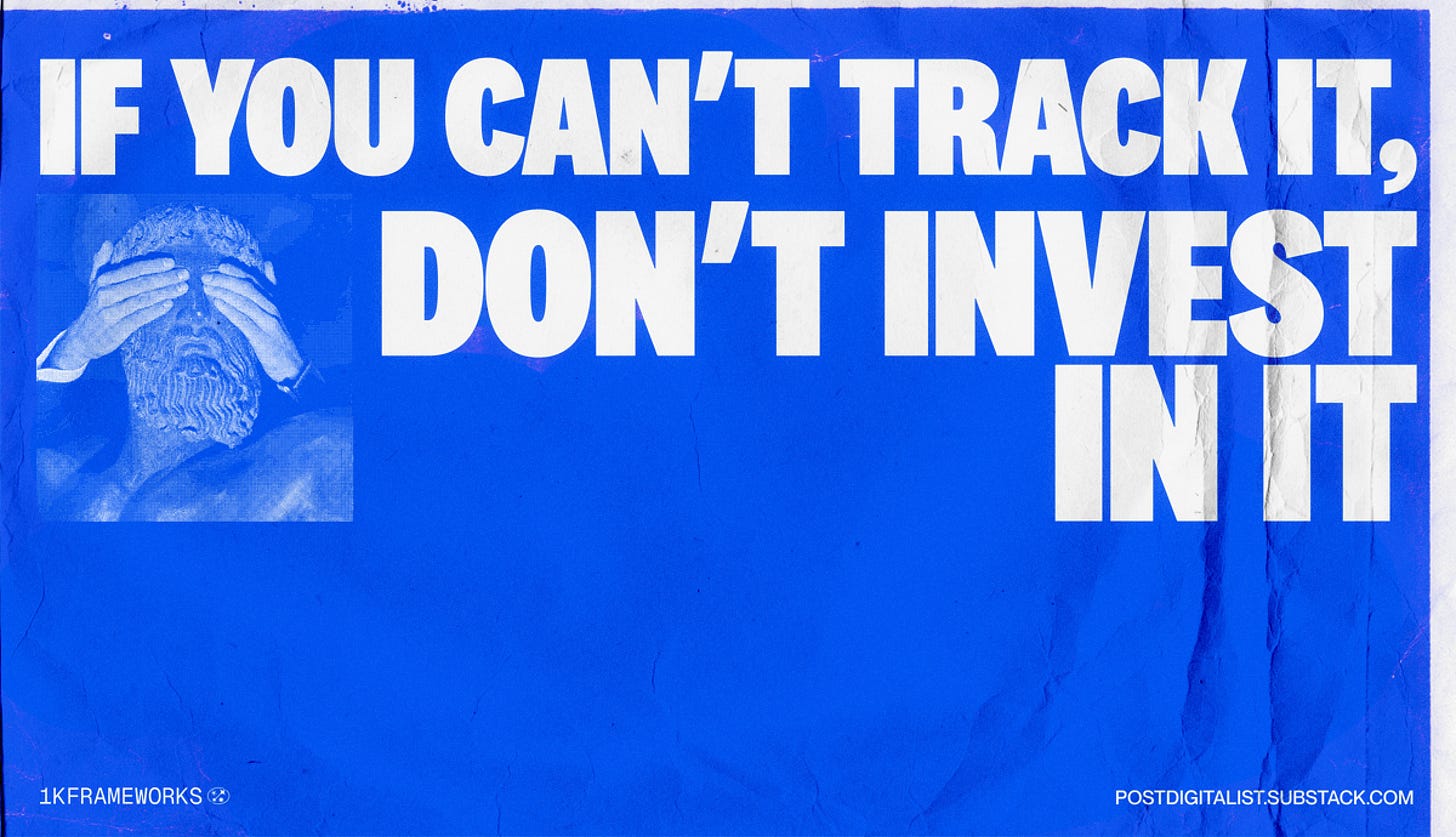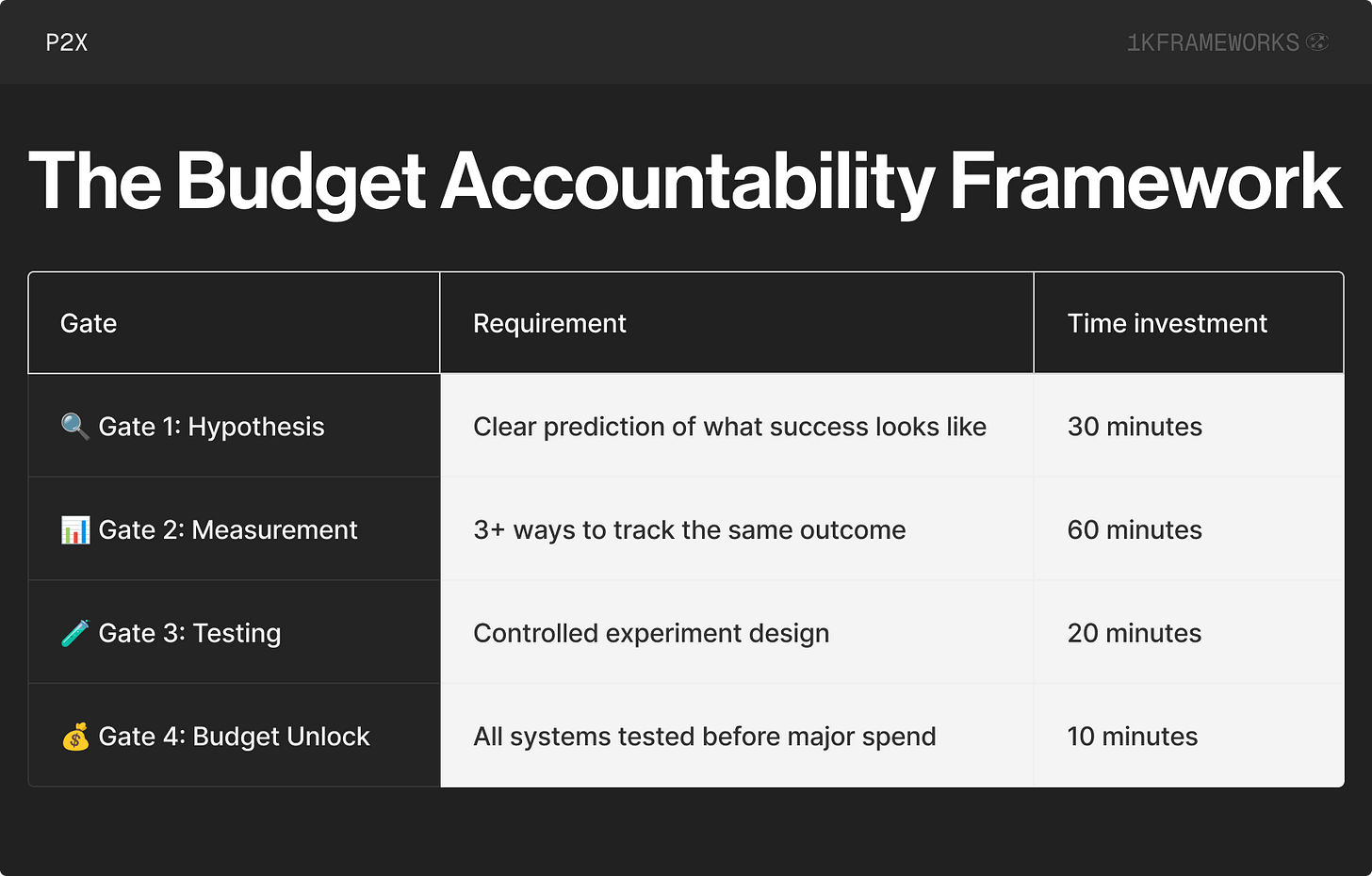Framework #3: How to stop wasting your marketing budget on campaigns you can't track
The $90K wake-up call that changed everything
TL;DR
The problem: Marketing budgets disappearing into black holes with zero visibility
The root cause: No systematic way to track what's working before campaigns launch
The solution: The Budget Accountability Framework - allocate, track, and optimize in real-time
The result: Budget waste eliminated, clearer ROI visibility
Time to implement: 2 hours to set up, 15 minutes weekly to maintain
Hey there,
Last quarter, I worked with a B2B SaaS company that had spent over $90,000 on content marketing in the last 12 months. They had some results - blog posts were ranking, organic traffic was growing. But when we dug deeper:
SEO wasn't even in their top 3 acquisition channels
They knew which keywords were ranking, but not which content was actually generating leads
The team had zero visibility into which content formats actually drove conversions
There was no system to connect content investment to pipeline generation
That's $90,000+ with decent vanity metrics but no real business impact. They were flying blind on what actually worked.
The worst part? This isn't unusual. 73% of marketing budgets have zero attribution visibility because teams launch campaigns and long-term programs (💀) without building tracking first.
Of course, before publishing a single new blog post, we fixed this client’s attribution system! And we designed a way to make sure this never happens again - a way to make every dollar accountable before you spend it.
Here it is:
The real cost of untrackable campaigns
Remember the rush to TikTok ads in 2022?
Most B2B companies burned through budgets like:
Week 1: "Let's test $10K on TikTok!"
Week 4: "The dashboard shows... nothing useful"
Week 8: "We spent how much? On what content?"
Week 12: "Yeah, let's pause TikTok and try LinkedIn Video"
A 2023 study by the World Advertising Research Center showed that, on average, 40% of marketing spend has 0 impact. But poorly tracked campaigns don’t just waste money:
Opportunity - Missing what actually works while chasing shiny objects
Career - "Marketing can't prove ROI" becomes your brand
Competitive - Rivals who track better scale faster
Meanwhile cookie deprecation and AI search are making attribution even harder. The old "set it and forget it" tracking is completely broken.
Google Analytics will tell you 500 people converted from organic search. Facebook will claim credit for 400 of those same conversions. LinkedIn says actually, 300 came from their platform. Do the math - that's 1,200 conversions from 500 people.
The Budget Accountability Framework: 4 tracking gates
We designed a budget accountability framework based on 4 tracking “gates”. Your initiative has to “pass through these gates” in order to be approved.
You can't manage what you can't measure. This framework forces measurement design before budget deployment, eliminating the "spray and pray" approach that burns cash.
Before: "Launch first, figure out tracking later".
After: "No budget released until tracking is bulletproof".
The 2-hour implementation plan
Step 1: Campaign hypothesis (30 minutes)
For your next campaign, write:
"I believe [specific audience] will [specific action] because [logical reason - ideally backed by historical data]"
"Success means [specific metric] within [timeframe]"
"I'll know it's working when [3 measurable signals]"
Step 2: Triple-track setup (60 minutes)
Create 3 independent ways to measure the same outcome:
Platform tracking (Facebook Ads, Google Ads, etc.)
Website analytics (Google Analytics, UTM parameters, PostHog)
Business system tracking (CRM, email platform, direct attribution)
Step 3: Test your tracking (20 minutes)
Before spending real budget:
Test a minimum viable campaign
Verify all 3 tracking methods capture the conversion
Fix any gaps before scaling up
Step 4: Budget gate process (10 minutes)
Create this checklist - no budget released until every box is checked:
Hypothesis documented
3+ tracking methods active
Test conversion tracked successfully
Success metrics defined
Weekly review scheduled
Made sure to add context/relevant links that help understand how each step was carried out.
Pro tip: Use a simple spreadsheet to track this. Fancy tools aren't necessary - discipline is.
Your next steps
Audit your current campaigns - how many can you actually track end-to-end?
Implement gates for your next campaign launch - start with just one campaign this week
Measure tracking coverage after 30 days - aim for 80%+ budget visibility
Let me know how it goes!
The bottom line
Stop treating your marketing budget like a slot machine.
Every dollar should be accountable. Every campaign should be traceable. Every result should be measurable.
Your CFO will stop questioning marketing ROI. Your team will optimize with confidence. Your growth will accelerate because you'll actually know what's working.
Want me to review your tracking setup for free? Book a 30-minute live session - I'll audit your current attribution and suggest fixes.
Talk soon,
Aaron
P.S. This Friday I'm sharing the framework that helped a $50M company discover their "best performing" channel was actually losing money on every customer. The math will shock you.






